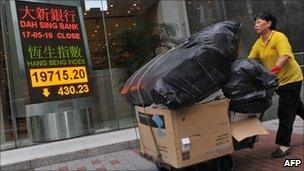Hong Kong seeks minimum wage deal
- Published

Employers in Hong Kong say minimum wage laws could harm the economy
Hong Kong's wage commission has announced it has agreed on a figure for the territory's first minimum wage.
But the agreed level - likely to raise the earnings of 11% of the working population - is unlikely to satisfy employers or workers.
The territory is out of step with both Taiwan and mainland China, which already have minimum wage laws.
Hong Kong, as a semi-autonomous region, largely makes its own laws.
Employers do not like the idea of a minimum wage here - they say it could have a negative impact on the economy.
But the territory's unions argue that it is good for stability.
Growing gap
Unions have been demanding a figure of HK$33 per hour ($4.24, £2.75), while employers desired HK$24. The commission is believed likely to go for HK$28 per hour.
Hong Kong has a big wealth gap, one that has become wider in recent years due to a series of financial crises.
Union legislator Lee Cheuk-yan says the Hong Kong government has recognised that the lower paid workers are struggling to feed their families and are angry.
"A very large or huge income disparity actually is not good for stability and I think the reason why the government now decided to set a minimum wage is because they feel the anger of the working people, the widening gap between rich and poor," Mr Lee said.
The final figure is unlikely to please Mr Lee's unionists or Hong Kong's employers, who will continue to argue.
Many low-paid workers have to work long hours.
The impact, says Mr Lee, is that the long working hours are both unhealthy and have a direct impact on time shared with their children and family life in general.
The law also excludes the tens of thousands of migrant workers from the Philippines and Indonesia who work here as domestic helpers.